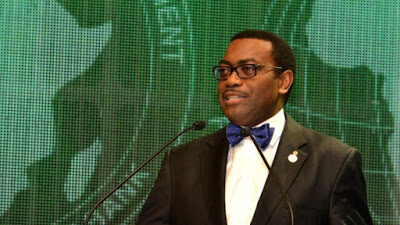Akinwumi Adesina, said that the Japan International Cooperation Agency (JICA)
has signed a 700 million dollar loan agreement with African Development Fund
(ADF).
Adesina said this in a statement made available to newsmen on Tuesday in Abuja.
He said the loan was part of Japan’s contribution to the ADF’s Fourteenth
Replenishment (ADF-14). He added that this was the first JICA loan provided to
the ADF.
He said that the loan would provide the ADF with resources to support recipient
countries during the ADF-14 period, from Jan. 1, 2017 to Dec. 31, 2019.
 |
| Akinwumi Adesina President African Development Bank (Photo credit:AfDB) |
The president said that the loan would contribute to economic growth as well as
poverty alleviation in Africa’s least developed countries.
“Thanks to Japan and its Government for keeping a promise. One often hears
about many international pledges of development cooperation remaining unfilled.
“I will like to commend the full accomplishment of Japan’s commitments to
Africa’s development with its 700 million dollars loan, which came on top of
328 million dollars in the form of a grant.
“Japan is a longstanding development partner for Africa, with a significant
portion of its aid commitments to the continent channeled through the AfDB
Group.
“Japan is the second-largest contributor to the ADF in cumulative terms and it
has increased its contributions significantly over time,” Adesina said.
Mr Tsutomu Iimura, the Chief Representative of JICA, said there was no limit to
the potential in the collaboration and synergies between the two institutions.
“JICA’s projects and contributions to ADF-14 will bolster the Bank’s capacity
to carry out its objectives in countries where support is most needed,” Iimura
said.
The ADF is part of the AfDB Group that provides support primarily to least
developed and poor countries in the form of very long term, low interest
financing.
JICA provides private sector development support through projects under Enhanced
Private Sector Assistance for Africa (EPSA), which the Government of Japan and
the AfDB launched as a strategy for support in Africa in July 2005.
Development Bank, AfDB says most African economies, especially the
non-resource-rich ones, grew faster than envisaged in 2017. But, the President
of the Bank, Akinwunmi Adesina, said at the 2018 Diplomatic Luncheon in
Abidjan, Cote D’Ivoire that the Bank’s investments and achievements inspire
confidence that prospects for growth in the years ahead are even brighter.
the global economic headwinds, climate and regional shocks.
2017, up from 2.2 per cent in 2016. However, 18 African countries grew above 5
per cent in 2017, and 37 countries above 3 per cent.
actually much brighter. Our own recently released African Economic Outlook
projects Africa’s GDP growth to accelerate to 4.1 per cent in 2018 and 2019.
envisaged, especially among the non-resource-rich economies, essentially
underscoring Africa’s economic resilience.
ever in its history, at $7.67 billion.
31 operations in 23 countries, and totaled $1.39 billion, representing a 30 per
cent increase over 2016.
a $2.5 billion 3-year global benchmark, followed by its largest ever 5-year
global benchmark for $2 billion.
2017, we mobilized $9.73 billion from the capital markets for African
countries, including $300 million from the Enhanced Private Sector Facility for
Africa.
the landmark Japan-Africa Energy Financing Facility. This will help accelerate
efforts to light up and power Africa, and I am most grateful to Prime Minister
Shinzo Abe for helping to make this happen.
We supported Morocco with $249.5 million to expand Ouarzazate, the largest
solar power plant in the world.
In Uganda, our support of $105 million for the Bujagali project will
generate 300 MW of power and cut electricity tariffs by 50 per cent from USc
14/kWh to just USc 7/kWh.
And in Burkina Faso, we supported the development of a 50MW solar project jointly
with the French development agency, AFD. The project will be the largest
utility scale solar power facility in West Africa.
And now, the Bank is spearheading the development of the Desert to Power
initiative, to harness electricity from the sun all across the Sahel.




